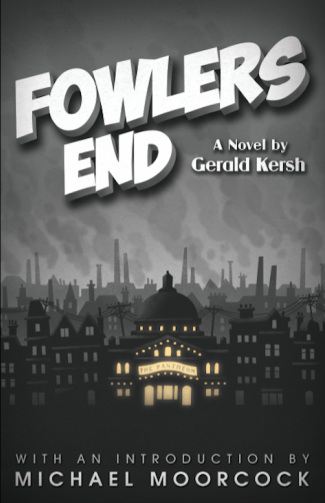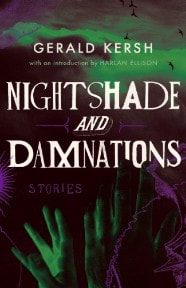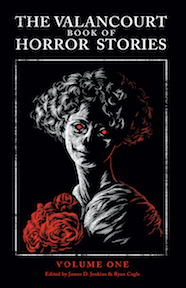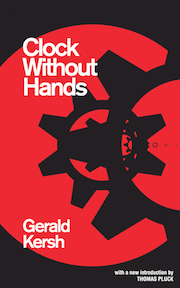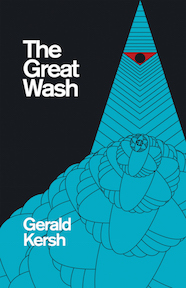|
BOOK DETAILS
Trade paper ISBN-13: 978-1939140487 List Price: $19.99 U.S. Pages: 304 Published: 2013 |
Fowlers End (1957)
Gerald Kersh With an introduction by Michael Moorcock Book Description
In the dirtiest, poorest, most woebegone corner of London is Fowlers End, one of the most godforsaken spots on the face of the earth. It is here that Daniel Laverock, starving and penniless at the height of the Great Depression, takes the only job he can find: manager of the Pantheon Theater, a dingy old silent cinema owned by Sam Yudenow. Yudenow, an incorrigible swindler and one of the greatest comic grotesques in English literature, at first seems merely an amusing old fool, but Laverock soon discovers he is actually a despicable scoundrel. And when one of Yudenow’s schemes finally goes too far, Laverock and his co-worker Copper Baldwin decide to teach him a lesson with a grand scheme of their own, with hilarious and unpredictable results. First published in 1957, Fowlers End is thought by many to be the masterpiece of Gerald Kersh (1911-1968). A comic romp with echoes of Dickens, Rabelais, and The Beggar’s Opera, Kersh’s novel remains one of the funniest English novels of the 20th century and one of the best works of fiction ever written about London. This edition features an introduction by award-winning novelist and longtime Kersh admirer Michael Moorcock. |
reviews
“One of the great comic novels of the century.” - Anthony Burgess
“[A]n exuberant romp with a parcel of grotesques in a truly horrible nor’-nor’-easterly suburb of London . . . great fun.” - Manchester Guardian
“Rabelaisian, vigorous, readable, inventive and bizarre.” - Simon Raven
“The very best of his works.” - Harlan Ellison
“[A] strange and compelling writer … [a] welcome revival.” – David Collard, Times Literary Supplement
“[A]n exuberant romp with a parcel of grotesques in a truly horrible nor’-nor’-easterly suburb of London . . . great fun.” - Manchester Guardian
“Rabelaisian, vigorous, readable, inventive and bizarre.” - Simon Raven
“The very best of his works.” - Harlan Ellison
“[A] strange and compelling writer … [a] welcome revival.” – David Collard, Times Literary Supplement
ALSO AVAILABLE THROUGH ONLINE RETAILERS
MORE TITLES BY THIS AUTHOR
AUTHOR BIOGRAPHY
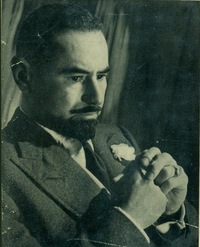
Gerald Kersh was born in Teddington-on-Thames, near London, in 1911. He left school and took on a series of jobs—salesman, baker, fish-and-chips cook, nightclub bouncer, freelance newspaper reporter—and at the same time was writing his first two novels. His career began inauspiciously with the release of his first novel, Jews Without Jehovah, published when Kersh was 25: the book was withdrawn after only 80 copies were sold when Kersh’s relatives brought a libel suit against him and his publisher. He gained notice with his third novel, Night and the City (1938) and for the next thirty years published numerous novels and short story collections, including the novel Fowlers End (1957), which some critics, including Harlan Ellison, believe to be his best.
Kersh fought in the Second World War as a member of the Coldstream Guards before being discharged in 1943 after having both his legs broken in a bombing raid. He traveled widely before moving to the United States and becoming an American citizen, because “the Welfare State and confiscatory taxation make it impossible to work over there, if you’re a writer.”
Kersh was a larger than life figure, a big, heavy-set man with piercing black eyes and a fierce black beard, which led him to describe himself proudly as “villainous-looking.” His obituary recounts some of his eccentricities, such as tearing telephone books in two, uncapping beer bottles with his fingernails, bending dimes with his teeth, and ordering strange meals, like “anchovies and figs doused in brandy” for breakfast. Kersh lived the last several years of his life in the mountain community of Cragsmoor, in New York, and died at age 57 in 1968 of cancer of the throat.
Kersh fought in the Second World War as a member of the Coldstream Guards before being discharged in 1943 after having both his legs broken in a bombing raid. He traveled widely before moving to the United States and becoming an American citizen, because “the Welfare State and confiscatory taxation make it impossible to work over there, if you’re a writer.”
Kersh was a larger than life figure, a big, heavy-set man with piercing black eyes and a fierce black beard, which led him to describe himself proudly as “villainous-looking.” His obituary recounts some of his eccentricities, such as tearing telephone books in two, uncapping beer bottles with his fingernails, bending dimes with his teeth, and ordering strange meals, like “anchovies and figs doused in brandy” for breakfast. Kersh lived the last several years of his life in the mountain community of Cragsmoor, in New York, and died at age 57 in 1968 of cancer of the throat.

